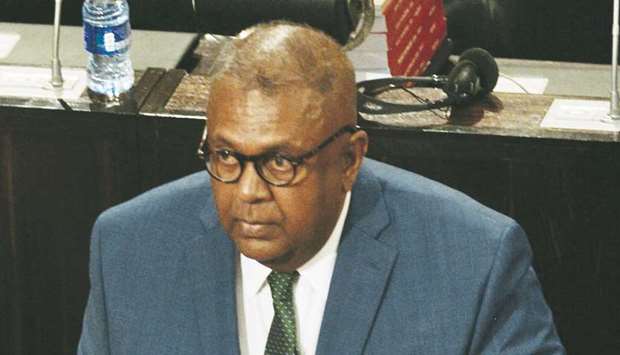Sri Lanka yesterday boosted spending on state employees, pensioners and the armed forces, and promised many rural infrastructure projects in a 2019 budget to woo voters before two elections, following a period of political instability.
Finance Minister Mangala Samaraweera raised taxes on the tourism sector, vehicles, liquor and cigarettes to meet government spending before a presidential election later this year and a general election in 2020.
He introduced a special allowance for all public sector employees and revised payments for pensioners. Public sector workers and pensioners account for 15% of voters.
Samaraweera also promised many rural infrastructure projects and to safeguard lower-income earners.
“We will invest more in social infrastructure and a social safety net,” Samaraweera told the parliament while delivering the budget with the theme of “Enterprise Sri Lanka - Empowering the People and Nurturing the Poor”.
The government, led by Prime Minister Ranil Wickremesinghe, has come under heavy criticism for higher taxes, and tight monetary and fiscal policies that have crimped growth to a 17-year low and led to a sharp fall in the
rupee.
Wickremesinghe was reinstated as prime minister after a 51-day political face-off with President Maithripala Sirisena, who had sacked him, but was forced by a court ruling to
reinstate him.
Samaraweera set an ambitious fiscal deficit goal of 4.4% of gross domestic product (GDP), compared with 5.3% in 2018.
“Achieving 4.4% deficit target will be challenging and an uphill task,” said Danushka Samarasinghe, chief executive officer, Softlogic Capital Markets.
Trisha Peiris, product head at Frontier Research, said the budget “appears to target the middle-class segment more while proposing several loan schemes to the lower income earners”.
The government aims to increase spending by 13% in 2019 and increase tax revenue
by 21.3% compared with 2018.
Budget documents show the government plans to borrow Rs450bn ($2.51bn) via foreign commercial borrowing.
On Friday, the IMF said it had agreed to extend a $1.5bn loan programme for an additional year, effectively giving the government some room to boost spending before the elections.
Sri Lanka is struggling to repay its foreign loans, with a record $5.9bn due this year, including $2.6bn in the first three months.
It used its reserves to repay a $1bn sovereign bond loan in January.
The government is sticking to a medium-term economic strategy of cutting the deficit to 3.5% of GDP by 2020, an IMF target, which was earlier expected to be shifted to 2021.
Tight monetary and fiscal policies, along with intermittent floods and drought, have led to growth slumping to a 17-year low of around 3% last year, while the rupee fell 16% mainly due to foreign outflows from Sri Lankan securities.
Samaraweera expected this year’s growth to pick up to a pace of 3.5%.

Sri Lankan Finance Minister Mangala Samaraweera presents the 2019 budget to parliament in Colombo yesterday.
